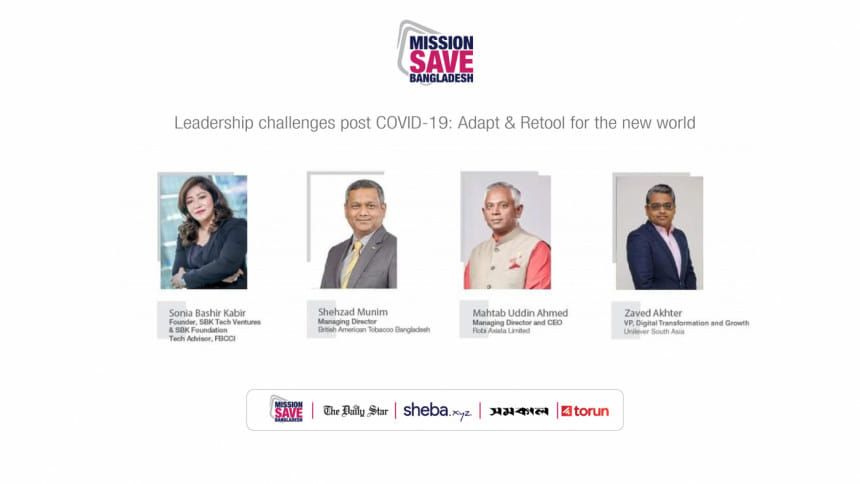Leadership Challenges post COVID-19: Adapt & Retool for the New World

On May 13, Mission Save Bangladesh in association with The Daily Star and Samakal arranged an hour-long live session on "Leadership Challenges post COVID-19; Adapt & Retool for the New World". The panel of experts for the discussion comprised of:
-Sonia Bashir Kabir, Founder, SBK Tech Ventures & SBK Foundation, Tech Advisor FBCCI, Shehzad Munim, Managing Director, British American Tobacco Bangladesh, Mahtab Uddin Ahmed, Managing Director & CEO, Robi Axiata Limited and Zaved Akther, VP, Digital Transformation & Growth, Unilever South Asia. They discussed some of key aspects on this issue.
We have all understood by now that the ripple effect of the pandemic is certainly going to be felt throughout the economy for a long time. At a crisis period like this, Mission Save Bangladesh arranged a panel discussion amongst veterans from different industries to talk about leadership challenges post COVID 19. The leaders shared their views on how to survive and excel during the upcoming turbulent times of rapid transformation.
Sonia Bashir Kabir talked about the three pillars of immediate response against COVID-19 being Executive competence, the ability to identify and focus on the instantaneously important issues, and to have the far-sightedness to think ahead in time and plan for the future.
"Crisis brings the best out of a true leader." With the rapid shift in consumer demand, retail and production chains, companies will need to come up with new and innovative ideas to exploit the market of the new normal. An agile and calculative risk-taking mindset for the leaders is an absolute necessity going forward. Regarding this issue, Shehzad Munim said, "If I'm in the fear zone, I'll be surrounded with troubles, but if, as a leader, I'm optimistic, I can discover the opportunities around me which I can utilize to bring a change. Agility will play a big role now."
A tendency of sticking to the status quo will definitely result in roadkill for any company. During these unprecedented times, the old playbook will prove futile. Corporate entities require a new way of navigation in these uncertain times with the help of dynamic planning and prioritizing confidence over fear.
It is natural to assume that an anarchic situation might break out in the post-COVID-19 times. To counter this, the government and corporate bodies in collaboration with one another need to make sure that the fair rules of the game are in place.
A monumental shift in the supply chain of products is already in the pipelines. We have seen a global collapse in the supply chain during this period which will surely spark a transformation. Localization of supply chains with an emphasis on directly reaching consumers will help to prevent such breakdowns in the future. In the meantime, it is necessary to cut out the intermediary middlemen to streamline the supply chain to make it as compact as possible as well as figuring out means to provide retailers with ample buying power through immaculate taxing systems and providing micro-credit.
The panel gave special emphasis to startups and the great scope that they will have to excel economically and solving socials problems as well. Then again, as a matter of fact not all startups will succeed. But those who will persevere definitely stand the chance to be powerful entities in the future. The ability to upscale and long term commitment will be the key to success in the startup arena.
The most radical change in the corporate world due to this pandemic has been the shift to the use of IT in solving day to day problems. Virtual offices have become and may continue to be a staple in the future of commerce. With that in mind, a personal sense of accountability and productivity will be very important. Processing large amounts of data through Data Technology to make decisions is the key to the future. According to Sonia Bashir Kabir, just collecting and shelving data won't bring any improvements. Rather we need to work out measures to convert the data into knowledge and use that knowledge to connect the producers to the consumers.
The ethical use and importance of corporate Social Responsibility were also discussed during the session. Mahtab Uddin Ahmed talked about how it is important for corporations to work for the community but in a way that is also relevant to its business. Through this, brands can connect with the people, help the society, and help the business grow or act as a subsidiary of the business at the same time. Shahzad Munim talked about not viewing CSR from a cynical viewpoint; rather an optimistic one and that long term CSR activities have a greater effect on the society at large in contrast to short term ones. They also mentioned Robi's affiliation with 10 Minute School and BDapps platforms and British American Tobacco's various CSR programs such as 'Bonayon', 'Dipto' etc. Sonia Bashir Kabir too shared her experience of doing CSR activities with Microsoft such as digital literacy programs and said that "CSR is a two-way street. All the companies should also focus on whether it's doing any harm to the environment as much as they are contributing to a positive impact."
All things considered, key personalities like themselves and others along with up and coming leaders of the future will have to guide us into the future of commerce with their diligent leadership. In the meantime, it is important that the businesses engrain their social purposes in their business models to solve the problems of society and uplift its people along the way. Zaved Akther very potently stated this as, "People keep talking about the post COVID world. We have to understand that we are in a period that will stay for a while. Every business has its own sets of purposes, and before jumping to the long term plans, every business should focus on solving the problems in the short term in a dynamic manner."
Apart from all the pessimism that we have been surrounded by when the leaders we look up to gifts us with frameworks that guide corporate individuals like me, we receive solace that makes us work harder, with more positive energy. I look forward to more sessions like this where we can all have some brainwave and inspiration.
You may watch the Facebook live by clicking the following link:
https://www.facebook.com/dailystarnews/videos/444929436354780/
The writer is Head of Marketing at The Daily Star and an alumni member of the exchange programme-US State Department. He is also the founding member of Mission Save Bangladesh

 For all latest news, follow The Daily Star's Google News channel.
For all latest news, follow The Daily Star's Google News channel. 








Comments